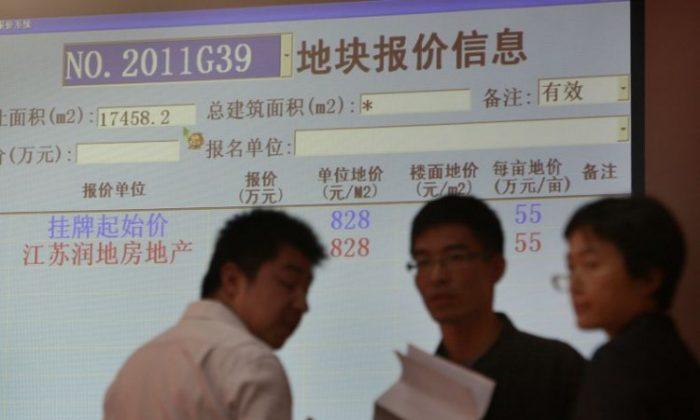China’s economy is on a dangerous track and may soon experience a crisis worse than the European debt crisis, Chinese economists say.
Since the Chinese regime implemented a series of “tightening” policies to curb the real estate market, home prices have been falling across China. Meanwhile, land sales--the main source of local governments’ revenues--have also dropped sharply.
In late October, several developers in Shanghai abruptly lowered home prices in new developments by 20 to 40 percent. Soon after, price cutting spread to Beijing, Hangzhou and Ningbo in Zhejiang Province, and Nanjing in Jiangsu Province. Recent homebuyers, unhappy about the sudden devaluation of their investments, staged protests with many demanding refunds.
End of Huge Profits
“The price cuts in Shanghai are just the beginning, the worst time will be the first season of next year,” an analyst at Centaline China Property Research in Shanghai told The Epoch Times. He added that the era of huge real estate profits will no longer exist in the next decade.
Economist Xie Guozhong recently stated at different occasions: “If China continues its tight monetary policy, many real estate developers will go bankrupt,” and “a 50 percent drop in property values will be the norm in China in the future.”
The large glut of unsold housing can only be digested by the market when prices drop to a level that is affordable to first time home buyers--which means there will be a significant drop in prices, Xie said.
Land Sales Cooling
Government land sales have also cooled off across the country, and local governments’ income from land sales has dropped sharply as a result. Zhuhai City in Guangdong Province serves as an example.
Southern Metropolis Daily said, data published by Zhuhai City’s Financial Bureau shows that land transfer fees in the first three quarters of this year have fallen significantly. Previously estimated at 8.8 billion yuan (US$1.4 billion), the Financial Bureau has adjusted them down to 5 billion yuan (US$788.65 million), a 3 billion yuan (US$473.2 million) reduction.
According to another analysis by First Financial Daily, revenues from land sales in Zhuhai City for the first 10 months of 2010 were 20.39 billion yuan (US$3.22 billion), which accounted for 24 percent of the city’s GDP, and a 14 fold increase from the previous year. Land revenue for the first 10 months of 2011, by contrast, are barely half that amount.
On Nov. 1, the city started implementing a new restriction on home purchases and prices. Many developers see this as a trigger for a new wave of real estate prices declining.
Financial Crisis Imminent
Cheng Xiaonong, an economist based in the U.S., told The Epoch Times that a 30 percent drop in home prices in a short period of time is a sign that a financial crisis is about to hit China.
“When the housing bubble bursts and developers go bankrupt, banks will grapple with high default rates and bad debt, resulting in a financial crisis in the banking system,” Cheng said.
Cheng said within a year China could experience a crisis worse than the European debt crisis. “Actually, a financial crisis has already erupted in China,” he said.
Chen Zhifei, an economics professor at New York’s City University told New Tang Dynasty TV that the rapid drop in both home and land sales will lead to drastic reductions in local governments’ land revenues, and local governments will make up the loss through taxation.
Such taxation would lead to mass protests and social instability as was seen recently in Huzhou of eastern China’s Zhejiang Province where a mass protest against taxation attracted worldwide attention, Chen said.
Economist and author He Qinglian told The Epoch Times that China’s real estate bubble should have burst in 2008. But at that time the Chinese regime put out a 4 trillion yuan (US$630.92 billion) stimulus package to save the economy, and half of it went to the real estate market and related fields, delaying the bursting of the bubble.
“The bursting of the bubble at the present time, its damage and negative impact on China’s economy, is a lot harder for the Chinese regime to deal with now,” Ms. He said.
Bursting the bubble gives China’s economy a chance to adjust the economic structure, and local governments should tighten their belts, since land revenues have dropped, Ms. He said.
“Nevertheless, they will increase taxes to raise their income, and China’s economy therefore will never be on the right track,” she added.
Ms. He said China’s economic development is a false prosperity achieved at the cost of damaging the environment and natural resources. Being the world’s factory, China doesn’t have its own brand name products. In addition China heavily relies on imports for its energy needs and has few resources to export except rare earth metals. Furthermore, with the largest peasant population in the world, China is unable to maintain self-sufficiency in food production.
Regarding some economists’ comments that the collapse of the real estate market will result in a “hard landing” for China’s economy, He said: “China’s economy has never taken off, so there is no such thing as a landing. Actually, China’s economy is more like an out-of-control high speed train that could derail at anytime.”





Friends Read Free